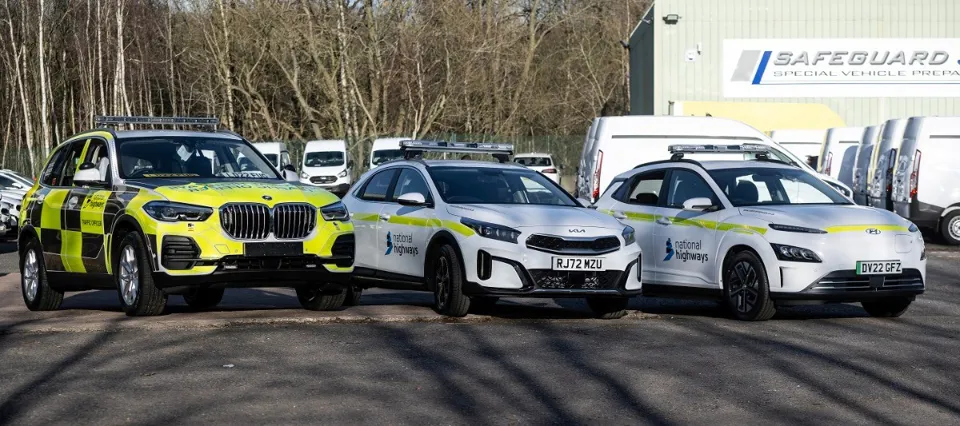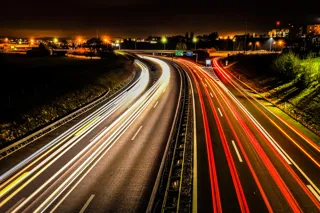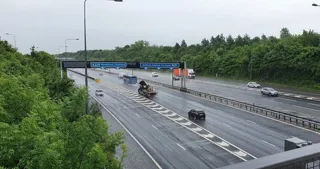National Highways has adopted 307 fully electric and plug-in hybrid electric vehicles (PHEVs) in an effort to decarbonise its fleet operations.
The new vehicles are expected to cut around 250 tonnes of CO2 emissions a year and will be put into service over the coming months.
By 2027, National Highways says 100% of non-traffic officer light vehicles will be electric, with all traffic officer vehicles switching to electric by 2030.
Traffic officer vehicles will become 100% electric three years later because it says that electric vehicle (EVs) meeting the “safety requirements required” are not expected to be available in 2027.
The company has also set an interim target of 75% of the fleet to be electric or hybrid by 2025, with its approach and speed of fleet changeover based on the market availability of suitable vehicles, the wholelife greenhouse gas footprint of different fuel options and when existing vehicles reach the end of their leases
The fleet management team will seek annual reports from our suppliers on the availability of low carbon heavier vehicles such as gritters and snow blowers.
It aims to have changed all of its gritter fleet over to hydrogen or electric by 2040
The new vehicles joining National Highways’ fleet include 31 zero-emission Hyundai Konas, which will be used for general maintenance and inspection pool cars, and 65 KIA Xceed PHEVs to replace existing vehicles used to conduct structural surveys.
It has already taken delivery of 187 PHEVs for traffic officer operations with another 24 on the way.
The company has also introduced Kia Xceed PHEVs to replace some of its existing diesel vehicles used by teams to conduct surveys of gantries, bridges and other structures across the Strategic Road Network (SRN).
Steve Elderkin, director of environmental sustainability for National Highways, says that the new vehicles will not only reduce emissions but also ensure that journeys are smooth and reliable.
"As a company, we operate more than 1,300 vehicles so introducing so many new electric vehicles and plug-in hybrids really helps accelerate our journey to net zero, drastically cutting our emissions,” he continued.
“Our net zero plan has laid out how we want to hit net zero for our own emissions by 2030, with a commitment that our non-traffic officer vehicles will be 100% electric by 2027 and traffic officer vehicles to be 100% electric by 2030.
"This is a huge step towards that commitment, and we will continue to invest in green and electric vehicles as the technology becomes available, meeting the Government’s Road to Zero strategy.”
Some 283 vehicles – Volvo XC90, BMW X5 (PHEV), Hyundai Kona (ZEV) and Kia Xceed (PHEV) – have already been distributed across the country, with 41 in Yorkshire, Humber and North-East, 37 in the North-West, 83 in the Midlands, 45 in the East, 48 in the South-East and 29 in the South-West.
The Volvo XC90 and BMW X5 have all been kitted out specifically for National Highways with enhanced storage capability, lighting and distinctive livery.
Andy Butterfield, national highways’ operations customer service director, said: “Our fleet supports the safe operation and ensures the network remains in a good condition. For instance, by helping us get to and clear incidents faster and keeping our roads free of defects.
"As part of this, our front-line operational teams provide a 24/7, 365 days a year service and play an integral part of our operation. These vehicles will not only withstand the rigours of the role but are also cost effective, versatile, reliable and greener.
“These vehicles will help ensure that the network can remain free-flowing and properly maintained while also significantly cutting our emissions as we drive towards net zero.”
David Spooner, managing director of Safeguard SVP, said that the variation of vehicles chosen for conversion have been “challenging from an integration and conversion” perspective.
“The team at Safeguard SVP has enjoyed the challenges presented by this project and look forward to working with the national fleet team in the future,” he added.
National Highways says it will reduce the carbon footprint from other travel by using technology to introduce new ways of working.
It will also update its travel policy to discourage flying and incentivise low carbon travel options, and it will update its expense policy to pay only for low carbon emission business travel (EV, Rail, and bus/coach) from 2026.
> Interested in comparing electric vehicle data? Check out our EV tool.
> Interested in ensuring the efficient use of EVs. Check out our dedicated editorial sections: Insight & policy | EV news | Charging & infrastructure | Costs & incentives | Benefit-in-kind | EV case studies | EV road tests
























Login to comment
Comments
No comments have been made yet.